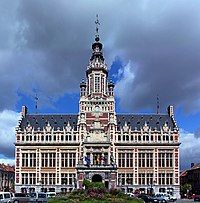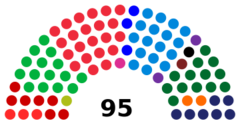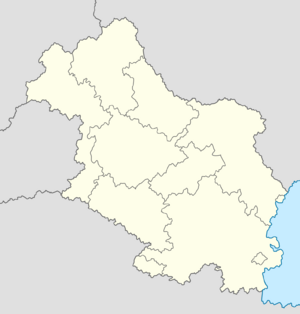User:Lyonsland/sandbox3
s'Holle | |
|---|---|
From top down, left to right: the city skyline, St. Charles Cathedral, the s'Holle Broadcasting Tower, Elsenplein central square, the Senaatsgebouw, and Cornelissen Park | |
|
Coat of arms of s'Holle Coat of arms | |
| Nickname: The Home of Hennehouwe | |
Location within Hennehouwe | |
| Country | |
| Region | s'Holle |
| Government | |
| • Body | s'Holle City Assembly |
| • Mayor–Governor | Marijne Tijhoff (SAP) |
| • Governing parties | SAP, VDP and Groen |
| • First Chamber seats | 7 (of 60) |
| • Second Chamber seats | 21 (of 180) |
| Area | |
| • Region | 332 km2 (128 sq mi) |
| • Metro | 1,803 km2 (696 sq mi) |
| Population | |
| • Region | 1,413,551 |
| • Rank | 1st (Hennehouwe, city) 3rd (Hennehouwe, region) |
| • Density | 4,300/km2 (11,000/sq mi) |
| • Metro | 2,741,380 |
| Demonym | s'Holler |
| Time zone | UTC+0 (Euclean Standard Time) |
| Postal code(s) | |
| Official languages | |
| Website | sholle |
s'Holle is the capital and most populous city of Hennehouwe. The city proper has a population of 1,413,551 and a metro population of 2,741,380 as of the 2018 census. One of the ten constituent regions of Hennehouwe and one of only two to be perscribed as a city region, s'Holle is wholly surrounded by the region of Flamia, of which the city was historically part of. The city is situated upon the southern end of the River Hol, from which its name is derived.
The city's origins trace back to the 8th century, when the Verliquoian Empire established a fortified settlement on the banks of the River Hol. Its size and relevance within the region grew over time, soon becoming the centrepoint of Gaullican rule in Hennehouwe. s'Holle remained a loyal vassal to Gaullica in its infant centuries, including throughout the War of the Jeans and the dissolvement of the Verliquoian Empire, though its distinct identity as a Hennish city formed with the bestowment of the Duke of Hol by the Gaullican Empire in 1367. The city became the de facto capital of the Duchy of Flamia upon the Partition of Hennehouwe, at which points its prominence as a wider financial and cultural centre increased. Upon the Flamish victory in the Gilded Wars, s'Holle became the effective capital of the whole country, though it remained under vast Gaullican influence until the declaration of the Second Republic in 1855. The city was occupied by Functionalist Gaullica from 1927 until its liberation by Estmerish and Weranian forces in 1933, and was the site of the Treaty of s'Holle in 1934. The subsequent establishment of the Third Republic in 1935 affirmed s'Holle's role as the capital of a federal Hennehouwe, and formally separated the city from Flamia as its own entity with established borders.
As a city region, s'Holle's regional government and legislature has expanded powers that would otherwise be separately granted to regions and municipalities. s'Holle comprises of twelve districts, with limited autonomy over local affairs. The city region's executive is overseen by the Mayor–Governor, whilst the districts' executives are overseen by district mayors.
s'Holle is Hennehouwe's political, economic and judicial centre. The city is home to the Senaatsgebouw, the world's oldest functioning stock exchange in the s'Holle Stock Exchange, and the Palace of Justice. At a global level, s'Holle is ranked as a second-rate city by the World City Studies Institute and is located on the Coastal Corridor. The city is also the location for a number of international institutions, chief among them the International Court of Arbitration and Justice (CIAJ).
Etymology
History
Early history
Verliquoian era
Early modern
Late modern
20th century
Modern day
Geography
Climate
Politics
Regional government
 |
 Government (54) Socialist Labour Party (22) Progressive Democratic Party (17) Green Party (15) Opposition (41) National People's Party (13) The Left (7) Patriot's March (7) Vox Hennehouwe (3) Red Party (3) People's Party for Sotirian Democracy (2) s'Holle List (2) LIVE – The Liberal Alliance (1) Future.he (1) The V Party (1) s'Holle Says No (1) |
s'Holle is one of two regions in Hennehouwe with designated 'city region' status – the other being Zilverzee. Under this constitutional designation, s'Holle has additional jurisdiction over affairs when compared with most other regions, due to its effective role as both a regional and municipal government. As a consequence, the city region's second-level administrative divisions, districts, have less autonomy than municipalities in other regions. s'Holle's own autonomy is granted by the 1935 Constitution, whilst its districts are governed by the regional-level s'Holle Districts Act.
The 95-seat directly-elected City Assembly (Stadsvergadering) functions as the city and regional legislature. Its members are directly elected every four years via proportional representation. 60 members are elected through open lists in the city's twelve districts, whilst the remaining 35 seats are allocated to parties via closed lists on the basis of the overall city-wide vote in order to ensure overall proportionality. As there is no electoral threshold for regional elections in the city, the regional legislature is frequently fragmented, with many minor parties gaining representation that would otherwise by unachievable at a wider level.
s'Holle's governing body is known as the City Executive (Stadshoofdbestuur) and consists of thirteen members from the controlling majority in the City Assembly. The City Executive is led by the Mayor–Governor (Burgermeester–Gouverneur), who is elected by a working majority of members in the City Assembly and whose title reflects their dual role as the head of a city regional administration.
Since the 2021 regional election, the City Executive is formed by a coalition of the Socialist Labour Party (SAP), the Progressive Democratic Party (VDP) and the Green Party (Groen). The current Mayor–Governor of s'Holle is Marijne Tijhoff of the SAP, who has served in that role since 27 July 2016.
Party support
s'Holle, like its sister city region Zilverzee, has historically been viewed as a heartland for the centre-left and for socialist-orientated politics at-large. This is largely owed to its role as the epicentre of industrialisation and in the development of worker's rights. The Socialist Labour Party, which was founded in the city in 1918 and is closely linked to the Hennish General Trade Union Association (HAVA), the country's largest trade union, has consistently been the most popular party since its founding. The party has won a plurality of the vote in every federal and regional election in s'Holle since the city region's formation in 1934, and has frequently enjoyed a single-party majority in the City Assembly.
Other left-wing parties, notably The Left and its predecessors, have also fared much better in s'Holle than in other regions of Hennehouwe. The Green Party have become a strong force in local politics in recent decades, and became the third-largest party in the regional legislature after the 2021 regional election. The liberal Progressive Democratic Party have maintained a steady electorate within the city, courting s'Holle's middle class and younger voters.
Right-of-center parties have consistently lagged behind their left-of-center counterparts, in a trend seen in most other major eastern Euclean cities. The center-right National People's Party significantly underperform in s'Holle when compared with the national average and are currently only the fourth-largest party in the City Assembly. Right-wing and far-right parties, such as the Patriot's March, have had some success in the capital in recent years, especially in white, working class areas.
Recent years have seen a consistent trend of reduced support for the SAP. The party lost its majority in the regional election of 1994, and have continued on a downward trend in support. In tandem with the drop for the SAP has been increased support for 'new' parties such as the Greens and the Patriot's March. The nonexistent threshold to enter s'Holle's legislature has resulted in representation for smaller parties and localist groups, the former of which have often first gained seats in s'Holle before achieving greater national prominence.








